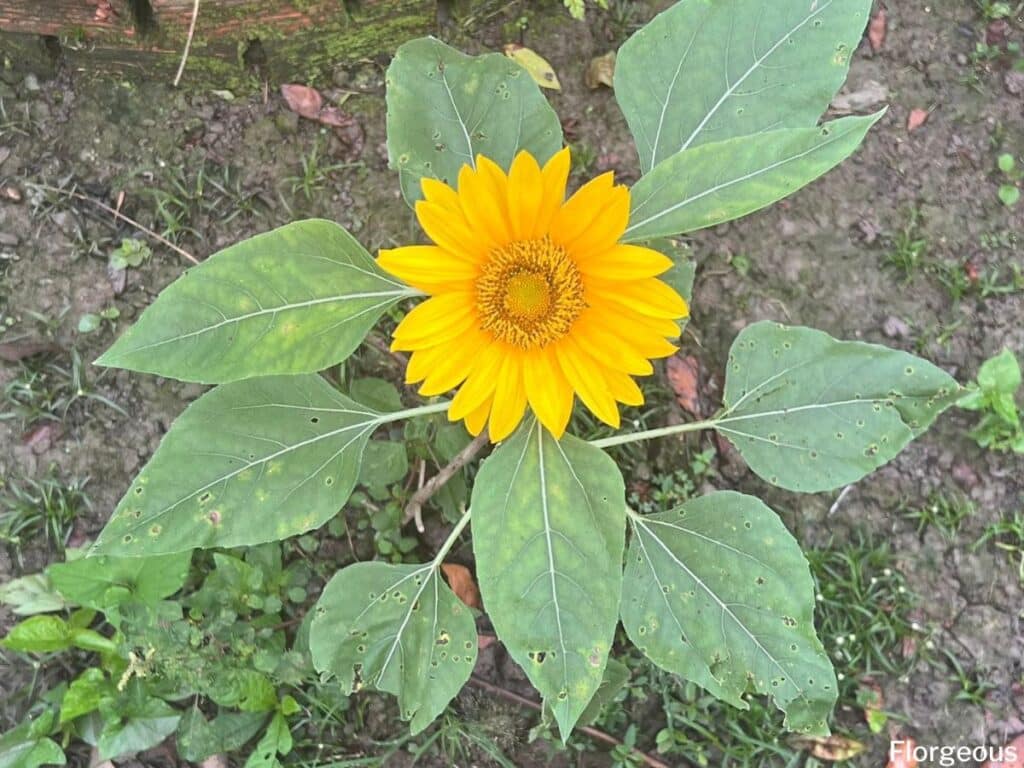Sunflowers (Helianthus) are easily identified by their large flower heads and vivid yellow colors. The large flowers of these tall plants have the rare ability to follow the sun and will keep rotating throughout the day.
Some of the best companion plants for sunflowers are marigolds, daisies and crimson clover.
Sunflowers are attractive plants that are often found in vegetable gardens but many also choose to include them in ornamental gardens because they can have a striking effect, especially if you pair them with plants that will complement their natural beauty.
There are many companion plants that grow very well alongside sunflowers. Choosing the right companions can help you optimize the growth, development, and look of your garden.
In this guide, we are going to take a look at some of the best sunflower companion plants to add to your garden while you are growing sunflowers.
What to Plant With Sunflowers
There are 70 different species of sunflower plants including annual and perennial varieties. Some of these varieties are absolutely huge and grown for sunflower seeds, while others are much smaller and preferable for ornamental purposes.
When you are choosing a companion plant for sunflower, you should first consider the variety you have. Not all varieties of sunflowers will be compatible with all plant species. All sunflower species do however have very similar growing conditions.
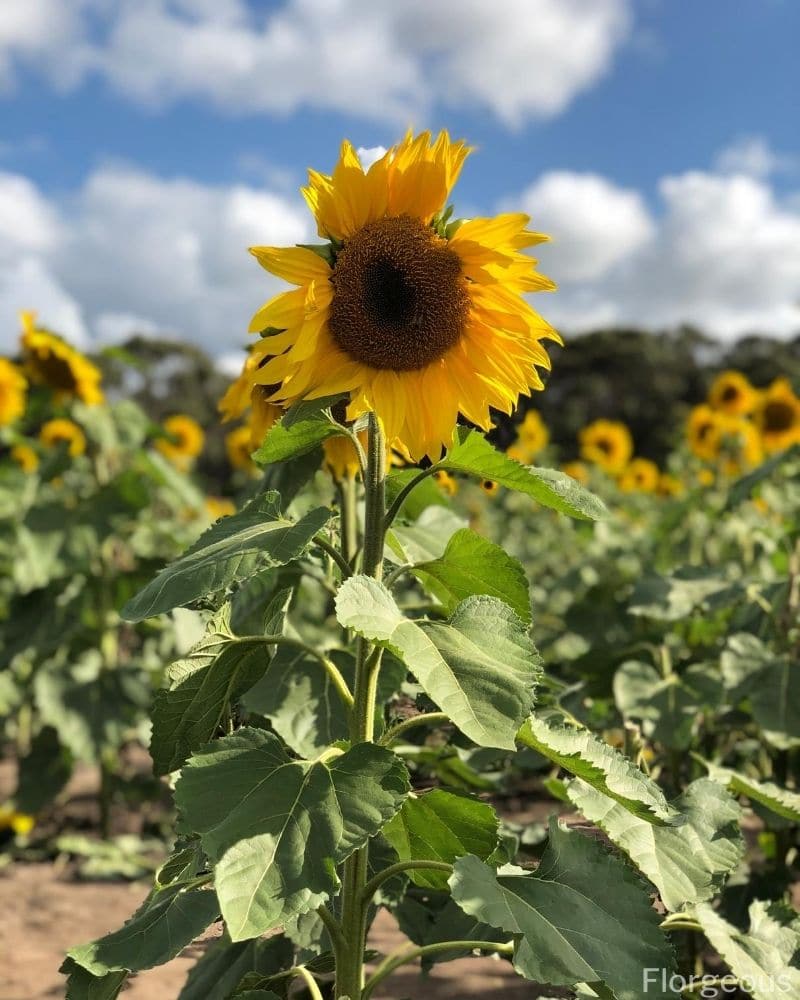
When it comes to sunflower care, these rapidly growing plants require plenty of direct sunlight (6 – 8 hours of direct sunlight), have a deep root system, and need lots of loose well-drained soil. Sunflowers flourish in alkaline-rich soil types with a pH of 6.0 – 7.5.
Let’s take a look at some other plants that have a similar growing need as sunflowers that are suitable for companion planting.
Beneficial Plants That Grows Well with Sunflowers
Gardeners often refer to the “Three Sisters” when they are discussing companion planting. These “three sisters” include beans, corn plants, and squash plants and are renowned for their harmonious allelopathic relationship when grown together in the same garden bed.
Gardeners also often add an additional member, sunflowers, to the trio to form “The Four Sisters”. The four sisters are the overall best companions to include in garden beds because they each contribute a significant amount of benefits.
Sunflowers, for example, will attract pollinators, are great shade providers and can act as a hedge for vine plants to grow on.
Let’s take a closer look at the other three sisters and the benefits they will bring to the garden.
Corn
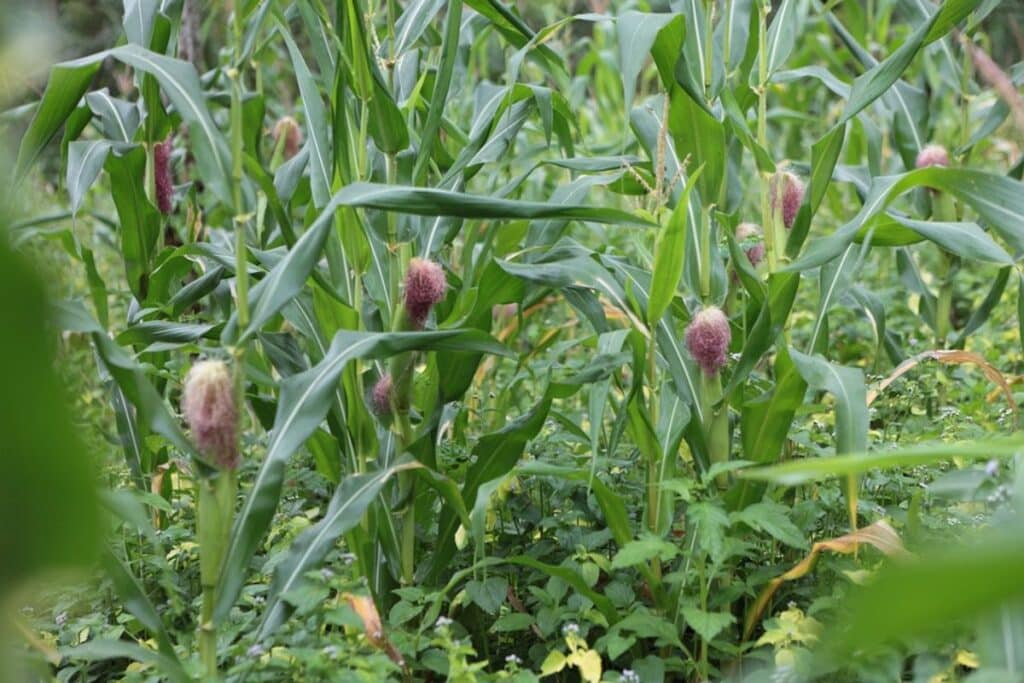
Sunflowers can be used to replace Corn (Zea mays) in the “Three Sister” combination or can be grown alongside corn for optimal effect.
When corn and sunflowers grow together, the shield they form behind or in front of other vegetables is enforced. The bright flowers of the sunflower plant will attract pollinators that can increase your corn yields. These bright flowers are also a great food source for bird species and can distract birds so they will leave your corn heads alone.
When you are pairing sunflowers and corn in the same garden bed, you should take care to grow them alongside one another and not in front of one another. Both of these tall plants require lots of direct sun and will deprive the other of light. It is best to line them or to keep your sunflower and corn rows separate.
Both of these plants are drought-tolerant and can handle most soil types except waterlogged soil. If you offer water sparingly, your corn and sunflower crop should form a powerful hedge.
Beans
Beans (Phaseolus vulgaris), or any type of legume plant (Fabaceae) including peas, bush beans, and vine beans, are excellent sunflower companion plants because they can nourish your sunflowers.
Sunflowers are nutrient-hungry plants that draw a lot of nitrogen from the soil. Beans, on the other hand, are known for their ability to restore the nitrogen levels of soil. Pairing these plants can bring great balance to your garden especially since the sunflowers lure beneficial insects that can pollinate the beans.
A lot of gardeners prefer to grow vine bean varieties because the sunflower stalks will act as a natural trellis for your pole beans. This can keep your beans off the ground and pest or disease free. You can also grow bush beans next to sunflowers because the bushy plants will act as a living mulch and can keep the soil moist and cool for longer.
Beans might need a little bit more watering than sunflowers. They can grow well alongside one another as long as you establish them in well-draining soil and ensure that your bean plants will still get sufficient sunlight.
Squash
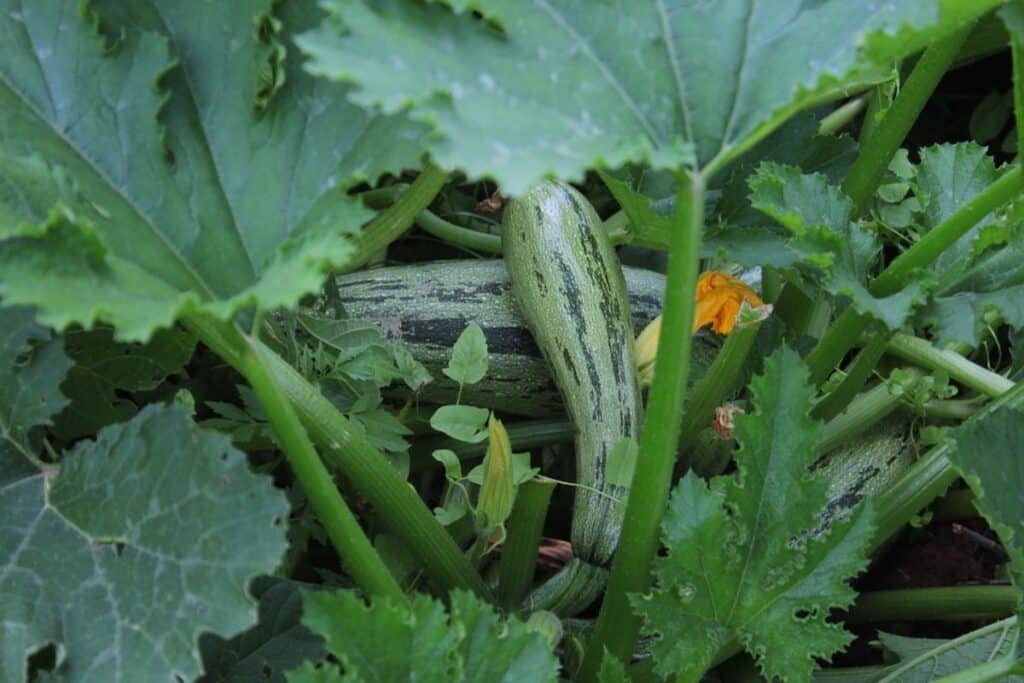
Squash plants (Cucurbita) are also one of the three or four sister plants. Most squash varieties including zucchini, butternut, acorn squash, blue Hubbard squash, and many others can be successfully grown alongside sunflowers.
The sunflowers will offer some needed shading to help these plants flourish. Sunflowers attract pollinators that will pollinate your pumpkin blossoms, and the bright sunflowers can act as trap crops to keep pests like white flies, squash vine borers, and caterpillars away from your vegetables.
Varieties of squash vines can also use the sunflower stalks as trellis so ants and other pests won’t make a meal out of your vegetables.
The squash, in return, will act as a ground cover to keep the soil cool and moist so sunflowers can grow healthy. Squash will also keep weeds from sprouting and is helpful for warding off pests like rodents because they have lots of sharp spikes on their leaves and stems.
If you are pairing sunflowers and squash in your vegetable garden then you should be careful to leave plenty of room between the squash and other plants.
Squash can grow vigorously and can easily smother some other plants. It is also best to grow sunflowers and corn before you grow squash so these plants will have a head start.
Most gardeners recommend you grow pole beans between sunflowers and squash because green beans help restore nutrients in the soil so your sunflowers won’t starve.
Best Flowering Companion Plants for Sunflowers
Sunflowers are extremely beautiful and some varieties like Autumn Beauty, Holiday, Ikarus, Moulin Rouge, and Valentine are specifically grown for ornamental purposes. These varieties are not as tall as commercial sunflowers but offer similar benefits and are also very attractive. Let’s take a quick look at the best floral companion plants to grow with sunflowers.
Crimson Clover
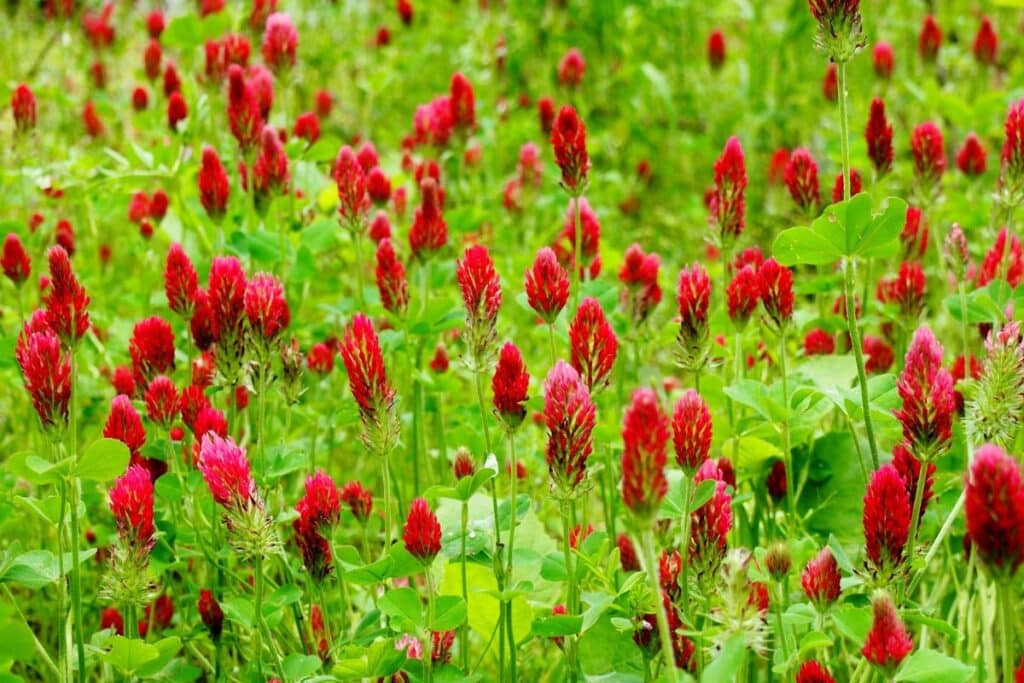
The crimson clover (Trifolium incarnatum) is an excellent companion plant if you are looking for a good ground cover that can deter weeds and attract pollinators to your garden.
Crimson clover plants are also helpful for restoring your soil’s nitrogen levels which can help sunflowers flourish. These plants will even act as mulch and will increase organic matter in the soil while keeping the soil cool.
When these annuals bloom, they will produce lots of spiky red flowers that can create a striking contrast underneath the vivid yellow flowers of sunflowers. These low-profile plants need to be planted at the right time if you want them to bloom along with your sunflower blooms.
These flowering plants grow well in zone 6 soil types and they love plenty of sunlight so you can easily establish them in that sunny spot where you keep sunflowers. The flowers grow well in sandy soil types but can die out in waterlogged soils or clay soil types.
Marigolds
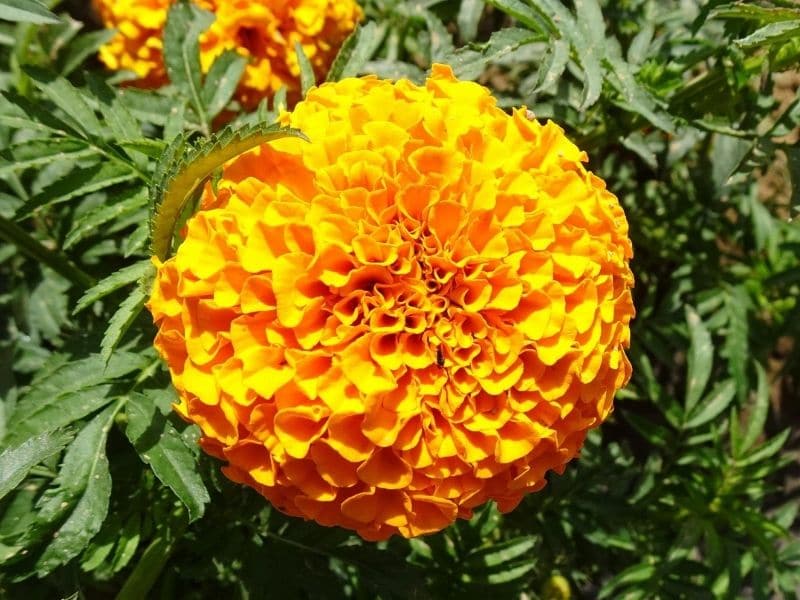
The bright yellow and orange flowers of marigolds (Tagetes) can complement the vivid colors of sunflowers and will help attract lots of pollinating insects to your garden.
These colorful flowers also act as a trap crop to protect your sunflowers because they will attract aphids away from your vegetable garden.
The strong scent of marigold flowers can also deter pests like mosquitoes, cabbage worms, cucumber beetles, and nematodes that can affect your sunflowers or other plants in the vegetable garden.
Marigolds are very easy to grow because they are drought-tolerant and very hardy. They have a much lower stature compared to sunflowers and as such won’t deprive sunflowers of sunlight.
The line of marigolds will do a great job concealing the dull base of the sunflowers so your ornamental garden will look much better.
Most gardeners recommend you grow Marigolds on the east side of sunflowers because these flowering plants need plenty of direct sunlight to bloom. A row of marigolds behind sunflowers isn’t going to flower as well as it should.
See more: What flowers go with marigolds
Daisies
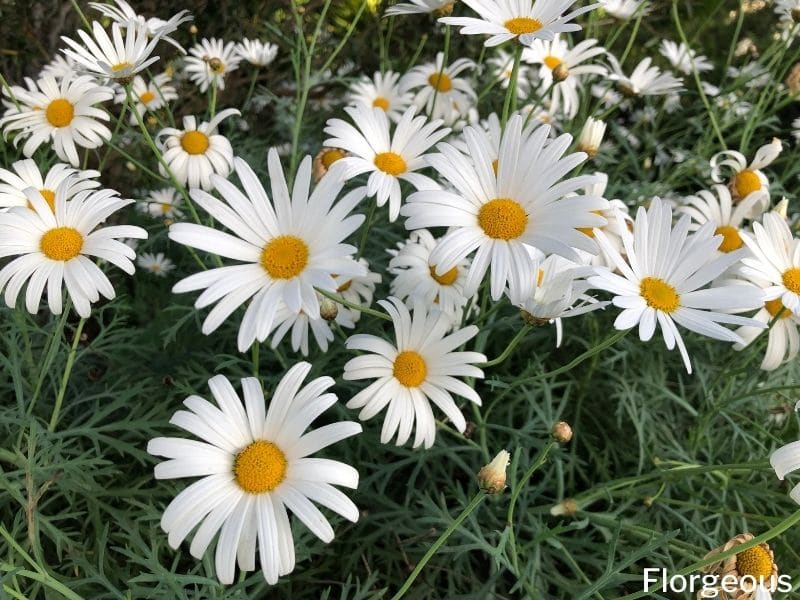
Daisies (Bellis perennis) are ideal companion plants if you need something to cover the ground underneath your sunflowers. This is because daisies need a bit more shade and tall sunflowers provide shade that these flowers might need to survive and thrive.
English daisies also offer additional benefits since they can keep the soil nice and cool and will keep some of the moisture trapped in the soil. These plants will also attract ladybugs which will fight off aphid infestations and they are great for weed control.
You will also benefit from growing sunflowers with daisies. This pair will look charming when they are in full bloom and daisies have medicinal properties.
Daisies can grow in full sun but will grow well in the shade of your sunflowers. They are relatively drought-tolerant and have the same growing season and conditions as sunflowers.
Other Great Sunflower Companions
Sunflowers can be successfully grown with a variety of plant species and they can benefit vegetable gardens a great deal. Here is a quick look at some other good vegetable varieties to pair with these lovely flowers.
Basil Plants
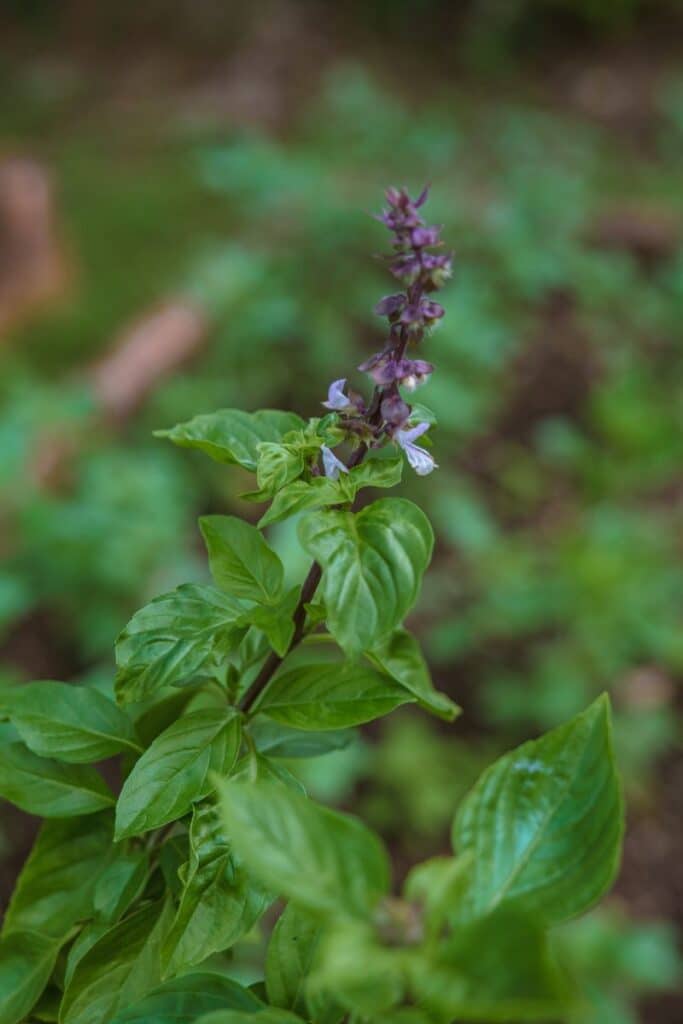
Basil (Ocimum Basilicum) is a wonderful companion plant to consider when you plant sunflowers. Sweet basil loves to grow next to sunflowers because the sunflowers offer just the right amount of shading to protect the herb from scorching sun rays. Basil will also repel pests like roaches that might feed on some of the plants in your garden.
The thick foliage is terrific for controlling tall weeds underneath your sunflowers and it will also protect your household from harmful pests like mosquitoes. You can also use sweet basil to prepare all sorts of delicious salads or enjoy it as a seasoning for pasta or pizza.
This edible plant is very easy to grow since it takes well to most types of well-draining soils. For optimal results, you should grow this edible herb right next to your sunflower crops.
Vine Tomatoes
Planting sunflowers near Vine Tomato varieties (Solanum Lycopersicum) can also be a good idea. These are good companion plants because they can use sunflowers as a trellis so those vines and tomato fruits won’t hang on the ground. The sunflower will also attract pest-eating beneficial insects that can defend your tomato growths while the tomatoes will attract pollinators that can boost your sunflowers.
When you are growing these two plants together, you should keep in mind that tomatoes need plenty of sunlight. It is best to establish your tomatoes on the side of sunflowers that receive the most direct sunlight.
You should also allow the sunflower seedlings to grow strong before adding some tomatoes to the garden bed. This will give the sunflowers a headstart and will keep the tomato vines from smothering your sunflowers.
Worst Sunflower Companions
Sunflowers can form unhealthy allelopathic characteristics when grown alongside certain plant types. However, if you pair these bad companion plants with sunflowers, you won’t see much growth in your garden at all.
Here is a quick look at what not to plant with sunflowers:
Potatoes
Potatoes (Solanum tuberosum) and sunflowers don’t get along at all. Sunflowers are toxic to potatoes and they can starve your sunflowers because potatoes need so many nutrients. There is also a greater risk of getting potato blight and verticillium wilt if you grow these two plants in the same garden.
Hyssop
The hyssop plant (Hyssopus officinalis) is a herb that you don’t want to add near a sunflower plantation. This herb is nutrient-hungry and can cause your sunflowers to starve.
FAQs
What do sunflowers interact with?
Sunflowers interact positively with a variety of plants and crops. They are known for companion planting benefits, attracting pollinators, repelling certain pests, and enhancing the overall biodiversity of the garden.
What can sunflowers tolerate?
Sunflowers are generally hardy and can tolerate a range of soil types, but they thrive in well-draining soil with good fertility. They are also quite resilient to heat and can tolerate dry conditions once established, making them adaptable to various climates.
What are the natural enemies of sunflowers?
Sunflowers may face challenges from pests like aphids, caterpillars, and birds, which can eat the seeds. However, these challenges can be mitigated through proper pest management and protective measures.
Final Thoughts
There are many companion plants for sunflowers that can boost your sunflowers or optimize your garden. We hope that our guide helped you find some great neighboring plants so your garden can look fantastic and flourish.
And if you need any more advice on companion planting for other plant species then we welcome you to have a look at some of our other guides.
See more: What do sunflowers represent?

